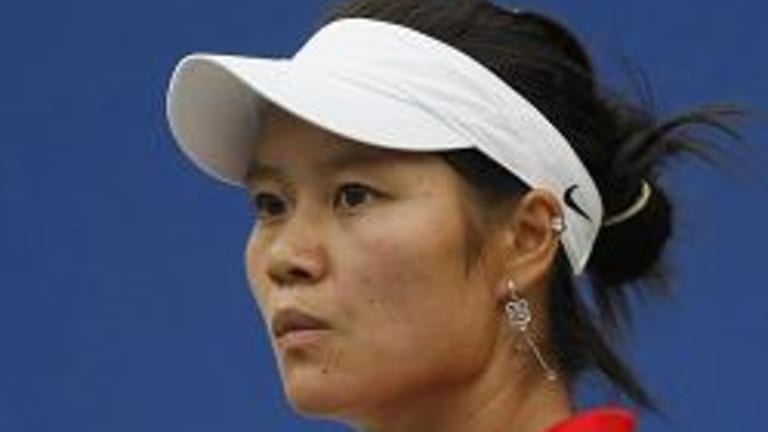!Beijing By Pete Bodo
Hi, everyone. I'll start turning my attention to the US Open tomorrow, and on Thursday, Heidi and I will represent the TWibe at the official US Open draw ceremony. On Sunday, I wrote an exclusive post for Sina.com, one of China’s premier websites, and as it will be translated into Chinese, I won’t just link to it. So here’s the English version, containing a few tweaks to eliminate content I’ve covered before and other not-entirely relevant material.
The Olympic tennis event did not, in the end, belong to the Chinese women. The squad secured the bronze medal in women’s doubles, and narrowly missed adding one in singles as well when Na Li fell to Vera Zvonareva in a tight third-place match. But the Chinese women fared well, coming up with a performance that would have done them just as proud if it had taken place at a Grand Slam event. This is no small feat, because they were performing on a far larger, more significant stage, and facing as intense a degree of pressure as any athlete might encounter.
In fact, it occurred to me at one point that the timing of the Beijing Olympics was just a little off; if the Games had been in 2012, we might have seen more Chinese on the medal platform, because the Chinese tennis arc is still developing at a bracing pace.
The Bejing tennis event was dominated by Rafael Nadal and the Russian women, and it would have taken nothing less than a few gold and/or silver medals by the Chinese to change that. Even that might have been insufficient, when you consider the way Nadal left his imprint on the event, and not entirely through on-the-ground events in Beijing. The games belonged to Rafa for three interrelated reasons:
1 – Nadal managed to impose order on an event that is, more often than not, a crap shoot, filled with improbable and surprising results. This is usually because the Olympics is a different kind of beast than a typical tournament. It’s most comparable to Davis and Fed Cup, and we’ve seen how often the established order crumbles when players must play not just for themselves, within the comfort zone of a neutral tournament site, but for their nations. Although the home court advantage, and the pressures it brings to bear, could have influenced only the Chinese, the weight of national representation is one equally borne by all the Beijing competitors.
2 – Nadal’s two-plus year drive to overtake Roger Federer happened to reach critical mass right before the Olympic Games, putting him under an even harsher than usual spotlight. The world eagerly held it’s breath, hoping for a final-round clash of the two titans. Nadal withstood the pressure – as well as the temptation to just kick back and enjoy Olympic participation - and showed up at the appointed hour. Federer couldn’t make the date; it was disappointing, but not critically so.
3 – Nadal’s performance gave Olympic tennis a degree of credibility it has, at some times in the past, lacked. Tennis players often rationalize that Olympic tennis is an oddity, a strange interlude rather than part and parcel of the entity we think of as the pro tour. Remember, Andy Roddick chose to skip the Olympics altogether, in order to concentrate on the US Open, and very few people criticized his decision.
But Nadal made a big statement that tennis fans ought to welcome in Beijing, because it probably enhanced the status of the game in the eyes of many sports fans who ordinarily don’t follow tennis. I was near Helena, Montana, at the start of the Games, and when I picked up the local newspaper, the lead sports story – taking up fully half of the entire front-page of the sports section - was devoted to tennis. It featured giant photos of the Top Three players. Suddenly, I felt very good about our sport.
These elements all sent out the signal that tennis ranks high in pecking order of international sports that matter. You can argue about whether or not tennis should be in the Olympics until the cows come home, and my own feelings on the subject have changed. I think it ought to be in, less because of its relative heft as a fixture on the world sports scene than because it is, by nature, so intrinsically and gloriously international.
With all due respect to Nicolas Massu and Mardy Fish, if those two players had contested this final, tennis would not featured so high on the public's radar. But Nadal's efforts seemed to captivate everyone. And let's face it, compared to the Olympic Games audience, the viewership numbers for Wimbledon and/or the US Open are a drop in the bucket. Nadal also demonstrated that the Olympics are as important for tennis players as any other athletes. Having such a competitive, exciting, satisfying tennis event did wonders for the game – especially among sports fans who still consider tennis a niche sport.
When it comes to the Russian women, their Olympics performance as a group may have lacked the sheer sex appeal of Nadal’s feat. But their sweep of the singles medals finally made good on the unrealized promise posted when the horde of Russian players followed Anna Kournikova’s footsteps onto the tour. While the Russians have been a powerful force in Grand Slam tennis, this was their most striking, significant and clear demonstration of the ancient principle, A rising tide lifts all boats.
